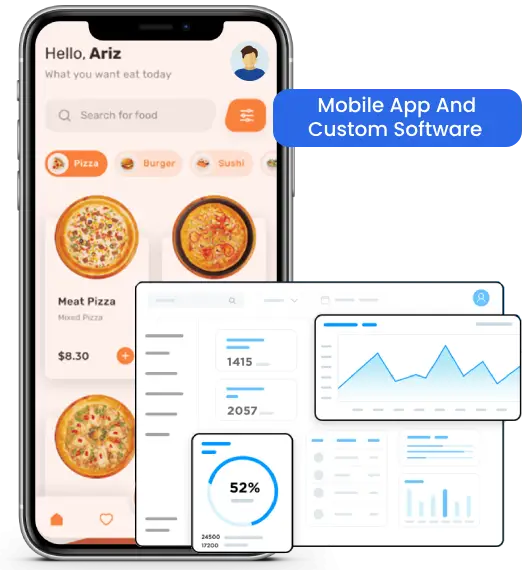Android app development has entered a transformative phase, powered by the integration of artificial intelligence. No longer limited to basic functionality, modern Android apps have evolved into intelligent systems capable of learning, adapting, and anticipating user needs. With AI embedded into everyday mobile experiences, apps now deliver features like personalized content, voice recognition, real-time recommendations, and predictive analytics. Leveraging technologies like Google ML Kit, TensorFlow Lite, and advanced cloud‑based AI services, developers have shifted toward building smarter, more context‑aware applications.
Android, as the world’s most widely used mobile platform, plays a crucial role in this revolution. Developers are tapping into open-source AI models and platform SDKs to rapidly innovate and enhance app performance. From automating routine tasks to offering tailored user experiences, AI is setting a new standard for mobile development and reshaping how users interact with apps and how businesses deliver value through technology. In this blog, we’ll cover what AI is in mobile app development, explore key statistics, examine its impact, highlight 2025 trends, explore top benefiting industries, and discuss key challenges.
What is AI in Mobile App Development?
AI in mobile app development refers to the use of smart algorithms that mimic human thinking, learning, and problem-solving capabilities. Moreover, these algorithms are embedded in the mobile app’s architecture to provide intelligent services and features. For Android, AI can be implemented using on-device processing (like TensorFlow Lite or Android Neural Networks API) or cloud-based AI services (like Google Cloud AI or Firebase ML).
AI in mobile development is typically built on a few core areas:
- Machine Learning (ML): Allows apps to analyze large datasets, detect patterns, and make informed decisions or predictions automatically without needing explicit programming for every task.
- Natural Language Processing (NLP): Empowers apps to understand, interpret, and respond to human language, supporting features like voice commands, chatbots, and text analysis.
- Computer Vision: Enables apps to process and interpret visual information from images or video in real time, powering features like facial recognition, object detection, and augmented reality.
- Predictive Analytics: Uses historical and real-time data to anticipate user actions or preferences, allowing apps to offer timely recommendations, alerts, and personalized experiences.
These technologies are no longer limited to complex enterprise applications. Everyday Android apps now include features like chatbots, voice assistants, facial recognition, intelligent search, and personalized feeds—all made possible through AI.
AI in Mobile App Development – A Statistical Overview
According to a report by Precedence Research, the global artificial intelligence software market was valued at approximately USD 209.29 billion in 2024. It is expected to grow significantly, reaching nearly USD 1,458.89 billion by 2034, with a compound annual growth rate (CAGR) of 21.43% from 2025 onward. The broader AI market, which includes hardware and services, is projected to reach over USD 3,680 billion by 2034. The AI software platform segment alone is forecasted to hit USD 88.19 billion by 2034, with a CAGR of 14.22%.
These numbers clearly show that AI is becoming an integral part of software development. Android, being the dominant mobile OS, is naturally one of the key areas where this growth is being realized. Developers and businesses investing in AI-powered Android apps are positioning themselves at the forefront of this rapidly evolving market.
Impact of AI on Mobile App Development
The influence of AI on Android app development is wide-ranging and deeply impactful. It starts with how apps are conceptualized and goes all the way to how they are maintained after launch. AI introduces intelligence into the app lifecycle, fundamentally changing how developers approach problems.
One of the key areas of impact is personalization. AI helps tailor content, UI elements, notifications, and even features based on individual user preferences and behaviors. Streaming services, news apps, and e-commerce platforms use AI to deliver highly relevant and engaging content.
Automation is another major benefit. Chatbots handle customer service 24X7. Image processing apps automatically enhance photos. Health apps detect irregular heart rates and suggest actions. All these examples show how AI reduces manual intervention and improves user satisfaction.
AI also improves app quality and reliability. Automated testing tools powered by machine learning can simulate thousands of user scenarios and detect bugs that manual testing might miss. AI-assisted coding tools help developers write cleaner, more efficient code, improving speed and accuracy.
AI has also changed how developers gather insights. Apps embedded with AI can continuously analyze user data to provide actionable feedback for updates and optimization.
Common AI Features in Mobile Apps
Today’s AI-powered Android apps come packed with features that were considered revolutionary just a few years ago. Some of the most common features include:

- Voice Assistants: Apps use AI-powered voice recognition to interpret commands, allowing users to interact with the app hands-free through natural language.
- Chatbots: AI chatbots provide instant customer support, resolving queries, guiding users, and simulating real-time conversations without human intervention.
- Recommendation Engines: These systems analyze user preferences and behavior to offer personalized suggestions for content, products, or services in real-time.
- Face and Object Recognition: AI enables camera apps to detect faces, scan documents, identify objects, and enhance security through facial recognition.
- Context-Aware Notifications: Apps use location, time, and user activity data to send timely, relevant notifications that improve engagement and retention.
- Fraud Detection: Financial apps leverage AI to monitor user transactions, flag suspicious activity, and protect against unauthorized access or identity theft.
- Predictive Text and Smart Replies: Messaging apps predict words or offer complete replies based on typing habits and conversation context for faster communication.
- Image Enhancements: AI editing tools adjust lighting, sharpen details, remove imperfections, or change backgrounds automatically to enhance photos with minimal effort.
These features not only improve user experience but also make apps more competitive and valuable in the market.
Mobile App Development Trends with AI in 2025
As we step into 2025, AI trends in Android development continue to evolve. Some notable developments include:
- Generative AI in Mobile Apps: Apps integrate generative AI models to create text, images, audio, and even code on the fly. Tools like ChatGPT APIs or Stable Diffusion are finding their way into creative apps.
- On-device AI Processing: Due to privacy concerns and latency reduction, more AI tasks are being performed locally on smartphones using TensorFlow Lite or similar libraries.
- Explainable AI (XAI): Users now expect apps to explain why a certain recommendation or decision was made, leading to better transparency and trust.
- AI-enhanced Accessibility: Voice-to-text, real-time translation, and object detection are helping make apps more inclusive and usable for people with disabilities.
- Cross-Platform AI Integration: Developers are using shared AI models across Android, iOS, and web apps, reducing development time and maintaining consistency.
Industries Benefiting the Most from AI-Powered Mobile Apps
Several industries have already embraced AI to build smarter and more efficient Android applications. The leading sectors include:

- Healthcare: AI-powered mobile apps monitor vital signs, analyze medical histories, detect early symptoms, and offer virtual consultations. Apps like symptom-checkers and fitness trackers provide real-time health insights and personalized wellness advice to users.
- Finance and Banking: AI enhances mobile banking by detecting fraudulent transactions, evaluating credit risk, and delivering personalized financial guidance. Smart chatbots and real-time alerts improve customer service, security, and overall banking experience on mobile platforms.
- Retail and E-commerce: AI-driven apps recommend products based on user preferences, personalize advertising campaigns, forecast inventory needs, and optimize supply chains. Features like visual search and augmented reality are modernizing the shopping experience.
- Education: AI-enabled learning apps adapt lessons to individual student needs, assess progress automatically, and create customized learning paths, allowing students to learn at their own pace with more effective and engaging content.
- Transportation and Logistics: Ride-sharing apps leverage AI for efficient route planning and demand prediction. Logistics companies use AI to monitor fleet health, anticipate delays, optimize delivery schedules, and provide real-time tracking for shipments.
- Entertainment: Streaming platforms use AI to analyze viewing habits, preferences, and sentiments, offering personalized recommendations for music, movies, and shows, thereby increasing user engagement and satisfaction.
Each of these industries benefits from AI’s ability to process large datasets, learn from user behavior, and automate decision-making.
Challenges of Integrating AI in Mobile Apps
While the benefits are undeniable, integrating AI into Android apps comes with its share of challenges. Let us explore them in detail:

- Data Privacy and Compliance: AI models rely on large volumes of user data, which must be collected, processed, and stored in compliance with strict privacy laws like GDPR and India’s DPDP Act to protect user information and avoid legal complications.
- Model Training and Accuracy: The reliability of AI predictions heavily depends on the quality of training data. If datasets are biased, outdated, or incomplete, the resulting models may deliver incorrect outputs, leading to poor user experience and potential reputational damage.
- Device Limitations: Many Android devices, especially low- to mid-range models, lack the necessary processing power to handle complex AI computations efficiently. Developers must optimize speed, memory, and battery life while ensuring the AI features remain functional and effective.
- Cost of Implementation: Building and maintaining AI features can be expensive due to ongoing costs such as cloud-based API usage, model hosting, data storage, and computing power for inference, making it less feasible for startups or budget-conscious development teams.
- Transparency and Trust: Users are increasingly cautious about how AI impacts their digital experience. Applications must be able to explain how AI-driven decisions are made to build user trust, especially when dealing with sensitive areas like health, finance, or personal data.
- Technical Complexity: AI integration involves advanced knowledge of machine learning, data science, and model optimization. Many Android developers may not have this expertise, making the learning curve steep and the development process more time-consuming and resource intensive.
Summing Up Everything
Artificial Intelligence is transforming the Android app development landscape by enabling smarter, faster, and more personalized mobile experiences. Companies offering android app development services now have access to advanced tools that allow seamless integration of voice assistants, recommendation systems, computer vision, and real-time analytics. The growing AI software market highlights the demand for intelligent mobile solutions across industries such as healthcare, finance, retail, and education. While challenges around privacy, performance, and transparency remain, the long-term benefits far outweigh the initial hurdles.
As a reliable custom mobile application development company, Dreamer Technoland specializes in integrating advanced AI solutions into Android applications, offering intelligent features tailored to user needs. Our services include the development of chatbots, recommendation engines, predictive analytics, and computer vision tools, all optimized for performance, privacy, and scalability. Utilizing both on-device and cloud-powered AI models, our in-house team ensures each solution aligns with modern security standards. Clients and businesses can benefit from comprehensive support across the entire development cycle, including architecture design, model training, privacy compliance, and performance optimization. We enable businesses to adopt AI seamlessly, bringing innovation to Android apps quickly, efficiently, and without added complexity.







